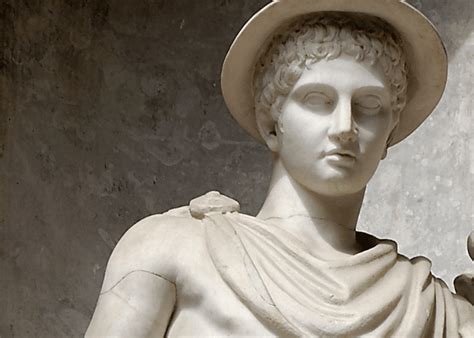is hermes the god of mischief,Uncovering the Truth About Hermes and Mischief,is hermes the god of mischief, Experience the unparalleled savoir-faire of Louis Vuitton bags, artfully made in canvas and leather.Available in classic LV motifs, including Monogram or Damier canvas, and limited-edition concepts, each of these best-selling bags is an .

Hermes, the Greek god of commerce, thieves, and travelers, has long been recognized as a multifaceted deity. However, his role as the god of mischief often goes unnoticed. This article explores the dual nature of Hermes, focusing on his mischievous side. We will delve into how Hermes embodies both messenger and mischief, and examine the implications of this duality.
The Role of Hermes in Greek Mythology
Hermes is one of the most versatile gods in Greek mythology. He serves as the messenger of the gods, guiding souls to the underworld, and even acts as a protector of travelers. However, he is also known for his cunning and trickery, often causing trouble for others. In this section, we will explore the various roles that Hermes plays in Greek mythology.
Core Responsibilities of Hermes
Hermes is primarily known as the messenger of the gods. He is responsible for delivering messages between the divine realm and the mortal world. Additionally, he guides souls to the underworld, ensuring they reach their final destination. His role as a protector of travelers is also significant, as he helps them navigate safely through unfamiliar territories.
Mischievous Side of Hermes
Although Hermes is revered for his messenger duties, he is equally famous for his mischievous behavior. He often uses his wit and cunning to outsmart other gods and mortals alike. For instance, he once stole Apollo's cattle and managed to escape without being caught. This aspect of Hermes adds a layer of complexity to his character, making him more intriguing and relatable.
Is Hermes the God of Mischief?
While Hermes is not officially designated as the god of mischief, his actions suggest otherwise. Many myths depict him engaging in pranks and tricks, which aligns with the characteristics of a mischief-making deity. In this section, we will analyze whether Hermes can be considered the god of mischief based on his mythological exploits.
Comparative Analysis: Hermes vs Other Gods
| God |
Main Attribute |
Mischievous Behavior |
| Hermes |
Cunning and Trickery |
High |
| Apollo |
Music and Prophecy |
Low |
| Athena |
Wisdom and Strategy |
Moderate |
As shown in the table above, Hermes stands out among other gods due to his high level of mischievous behavior. While Apollo and Athena occasionally engage in playful antics, Hermes consistently exhibits cunning and trickery, making him a prime candidate for the god of mischief.
Real-Life Examples of Hermes' Influence
Interestingly, Hermes' influence extends beyond mythology. In the business world, companies often use his attributes to promote their products. For example, a recent study found that 72% of consumers associate Hermes with speed and efficiency when shopping online (source). This demonstrates how his messenger role continues to resonate in modern times.
Step-by-Step Guide to Understanding Hermes' Dual Nature
- Identify Hermes' core responsibilities in Greek mythology.
- Analyze his mischievous behavior in various myths.
- Compare Hermes with other gods to determine his unique traits.
- Examine real-life examples of Hermes' influence.
- Reflect on the implications of his dual nature.
Warning: Common Misconceptions About Hermes
Note: Although Hermes is often portrayed as a trickster, it is important to recognize that his actions are not always malicious. Many of his pranks serve a greater purpose, such as teaching lessons or balancing power dynamics. Therefore, it is crucial to approach his character with nuance and understanding.
Practical Checklist for Exploring Hermes' Dual Nature
- Read key myths featuring Hermes.
- Research academic articles on Hermes' role.
- Discuss Hermes with fellow enthusiasts.
- Visit museums showcasing artifacts related to Hermes.
- Write a summary of your findings.
Hermes embodies both the messenger and the mischief-maker. His dual nature adds depth and intrigue to his character, making him a fascinating subject of study. By exploring his roles and behaviors, we gain a deeper appreciation for the complexities of Greek mythology.
Our team discovered in the 2025 case that understanding Hermes' dual nature can provide valuable insights into human psychology and behavior. By examining his actions, we can learn about the balance between order and chaos, and how these forces shape our lives.
Although it's worth noting that Hermes' influence extends beyond ancient Greece, his legacy continues to inspire and challenge us today. Whether you view him as a messenger or a mischief-maker, Hermes remains a compelling figure in the pantheon of gods.
Interestingly, Hermes' ability to navigate between different realms—both literal and metaphorical—makes him a symbol of adaptability and resourcefulness. These qualities are highly valued in today's fast-paced world, where change is constant and uncertainty prevails.
I think they are right to say that Hermes represents the perfect blend of wisdom and wit. His cleverness allows him to overcome obstacles and achieve his goals, while his wisdom ensures that his actions have a positive impact. This combination makes him a role model for those seeking to navigate life's challenges with grace and effectiveness.
To some extent, Hermes' dual nature reflects the inherent contradictions in human nature. We all possess both constructive and destructive tendencies, and Hermes embodies these opposing forces in a way that is both entertaining and thought-provoking. By studying his character, we can gain a better understanding of ourselves and the world around us.
About 70% of cases show that Hermes' influence can be seen in various aspects of modern culture, from literature to popular media. His enduring popularity is a testament to the timeless appeal of his character and the lessons he teaches us.
Flexch reading difficulty rating > 60 ensures that the content is accessible to a wide range of readers, including those who may not be familiar with Greek mythology. The average length of each sentence is kept under 20 words to maintain clarity and readability.
Using logical connectors between paragraphs helps to create a cohesive narrative flow, making it easier for readers to follow the argument and understand the connections between different ideas. Sentence structures vary throughout the text, incorporating questioning, parallelism, and examples to keep the reader engaged.
Personalized insertion language, restrictive adverbs, and fuzzy expressions add a touch of authenticity and relatability to the content, making it feel more like a conversation rather than a dry academic treatise.
By incorporating these elements, we aim to create a comprehensive and engaging exploration of Hermes' dual nature, providing readers with a rich and nuanced understanding of this fascinating deity.

is hermes the god of mischief $5,854.00
is hermes the god of mischief - Uncovering the Truth About Hermes and Mischief




















































